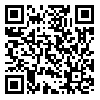BibTeX | RIS | EndNote | Medlars | ProCite | Reference Manager | RefWorks
Send citation to:
URL: http://rehabilitationj.uswr.ac.ir/article-1-2175-fa.html
URL: http://rehabilitationj.uswr.ac.ir/article-1-2175-fa.html
2- گروه مدیریت توانبخشی، دانشگاه علوم بهزیستی و توانبخشی، تهران، ایران. ،
3- گروه آمار زیستی، دانشگاه علوم بهزیستی و توانبخشی، تهران، ایران.
هدف امروزه استرس یکی از عواملی است که در سازمانها، بهداشت روانی کارکنان را با خطر مواجه کرده است. ماهیت و ذات محیطهای بالینی به گونهای است که این محیطها به طور اجتنابناپذیری تنش و استرس را به کارکنان تحمیل میکنند. استرسهای درکشده در محل کار بر کیفیت و کمیت عملکرد فرد تأثیر بسزایی دارد. شناخت راههای مقابله با استرس درکشده میتواند در پیشگری و کاهش عوارض ناشی از آن موثر باشد. از آنجا که محیطهای کار توانبخشی استرس زیادی دارند و این استرس میتواند کیفیت کار کارشناسان را تحتالشاع قرار دهد و بر سلامت مددجویان تأثیرات سویی داشته باشد، محقق بر آن شد تا با انجام پژوهشی با هدف تعیین رابطه هوش معنوی با استرس درکشده کارشناسان توانبخشی مراکز توانبخشی وابسته به بهزیستی شهر تهران و شمیرانات در سال ۱۳۹۶ رابطه این متغیرها را بررسی کند.
روش بررسی در این مطالعه توصیفی تحلیلی مقطعی به صورت همبستگی، ۱۶۳ نفر از کارشناسان توانبخشی (در رشتههای فیزیوتراپی، کاردرمانی، گفتاردرمانی، شنواییشناسی، بیناییسنجی، ارتوپد فنی، مددکاری و روانشناسی)با توجه به حجم نمونه مورد انتظار از بین مراکز موجود در بهزیستی شهر تهران و شمیرانات، ۹ مرکز از شهرستان تهران و ۱۱ مرکز از شهرستان شمیرانات به صورت نمونهگیری تصادفی ساده انتخاب شدند. سپس از مراکز مذکور معرفینامه دریافت شد. پس از مراجعه به مراکز مذکور تمام کارشناسان توانبخشی موجود در مراکز که معیارهای ورود به پژوهش را داشتند و حاضر به همکاری با پژوهشگر بودند وارد مطالعه شدند. با جلب همکاری مشارکتکنندگان، پرسشنامهها بین آنها توزیع و پس از تکمیل، جمعآوری و وارد فرایند تجزیهوتحلیل شدند. به منظور جمعآوری دادهها از پرسشنامه جمعیتشناختی، پرسشنامههای روا و پایاشده هوش معنوی کینگ (۲۰۰۸) (الفای کرونباخ ۰/۸۸) و استرس درکشده کوهن (۱۹۸۳) (الفای کرونباخ ۰/۸۴) استفاده شد. در این پژوهش از ابزارهایی استفاده شد که پژوهشگران دیگر در پژوهشهای مشابه استفاده کرده بودند و روایی و پایایی آنها تأیید شده بود. با صلاحیت تیم تحقیق نیاز به سنجش مجدد روایی و پایایی ابزارها احساس نشد. به منظور تجزیهوتحلیل دادهها از نرمافزار SPSS نسخه ۲۱ استفاده شد. برای توصیف دادهها از آمارهای توصیفی مثل میانگین و انحراف معیار استفاده شد. با توجه به نرمال بودن توزیع دادهها، برای تحلیل دادهها از آزمون ضریب همبستگی پیرسون و از آزمون تی مستقل برای مقایسه دو گروه استفاده شد.
یافتهها میانگین سنی شرکتکنندگان در پژوهش حدود ۴۰ سال بود که شرکتکنندگان حداقل ۲۳ سال و حداکثر ۵۴ سال سن داشتند. ۵۶/۵ درصد از افراد شرکتکننده در این پژوهش زن بودند. ۲۲/۹ درصد سابقه کار ۱۰ تا ۱۵ سال داشتند. نتایج نشان داد بین متغیرهای سن، جنسیت، سابقه کار، وضعیت تأهل، تحصیلات و نوع استخدام با هوش معنوی و استرس درکشده رابطهای وجود ندارد.همچنین بین هوش معنوی با استرس درکشده در کارشناسان توانبخشی مراکز وابسته سازمان بهزیستی شهر تهران وشمیرانات در سال ۱۳۹۶ رابطه مستقیم معنیدار وجود دارد (۰/۰۴۲=P).
نتیجهگیری با توجه به رابطه مستقیم هوش معنوی و استرس درکشده، برای افزایش هوش معنوی و کاهش استرس درکشده افراد، پیشنهاد میشود با توجه به اینکه هوش معنوی قابل یادگیری است، این قابلیت در سازمانها برای تمامی کارکنان به صورت دورهای آموزش داده شود. از آنجایی که پژوهشگر در جمعآوری دادهها، تنها از پرسشنامه به عنوان وسیله سنجش استفاده کرده است، لذا در تعبیر و تفسیر نتایج باید شرایط احتیاط را رعایت کرد و محتاط بود. بنابراین برای پژوهشهای جامعتر و کاملتر بعدی، شیوههایی مانند مشاهده، مصاحبه و سپس تحلیل محتوا توصیه میشود.
دریافت: 1396/3/25 | پذیرش: 1397/4/9 | انتشار: 1397/7/23
| بازنشر اطلاعات | |
 |
این مقاله تحت شرایط Creative Commons Attribution-NonCommercial 4.0 International License قابل بازنشر است. |








